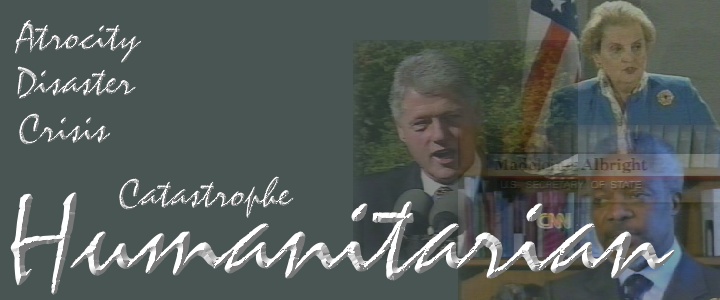
 |
Disaster, catastrophe, tragedy, disaster, crisis -- they used very strong language in characterizing the actions of the Serbs in Kosovo. Running through these characterizations is 'humanitarian' -- it is humanitarian disaster, humanitarian crisis, humanitarian catastrophe. 'Humanitarian' is their way of marking off the subject as one of concern for the condition of individual human beings: murdered, tortured, homeless, starving. These are the humanitarian atrocities.
This is the language of amplification; it is like shouting in a small, quiet space. Look here! Look at how terrible it is! The use of these characterizations in time shows the extent to which it is language used to heighten concern as part of a call to action.
| Jan | Feb | Mar | Apr | May | Jun | Jul | Aug | Sep | Oct | Nov | Dec | Jan | Feb | Mar | Apr | May | June | |
| Stories |
2
|
0
|
14
|
4
|
4
|
15
|
5
|
7
|
8
|
38
|
0
|
8
|
11
|
16
|
26
|
30
|
29
|
33
|
| Humanitarian |
0
|
0
|
2
|
0
|
0
|
0
|
1
|
3
|
2
|
12
|
0
|
0
|
1
|
0
|
15
|
17
|
15
|
8
|
October of 1998 and March, April and May of 1999 are the points at which the NATO allies were most active in working to relieve the humanitarian conditions of the Kosovars. In October 1998 NATO was threatening to bomb Yugoslavia unless they agreed to treat the ethnic albanians in Kosovo more humanely. At the end of the month a deal was made, and the NATO nations looked away. But by March of the next year it was clear that Milosevic did not intend to abide by the agreement, and the NATO nations went back to threatening and then they bombed. The bombing continued for another two and one half months before Milosevic again agreed to terms -- an agreement that has held. 'Humanitarian' becomes part of the dialogue in just those four months. It is in the text 12 times in October 1998 and 15, 17, and 15 times in the spring of 1999. As they negotiated, threatened and then made war they used the language of humanitarian disaster to characterize what was happening in Kosovo. This is why we must act. This is why you must change. You are producing a humanitarian catastrophe.
Yugoslavia made war on the Kosovars -- fighting and humanitarian disaster were of a piece. NATO made war on Yugoslavia, Yugoslavia intensified their war on the Kosovars -- fighting and humanitarian disaster were of a piece. The fighting and the humanitarian crisis were not distinct -- they were one. And the language of characterizing what was happening was as much of the piece as the fighting and what was happening to the Kosovars.